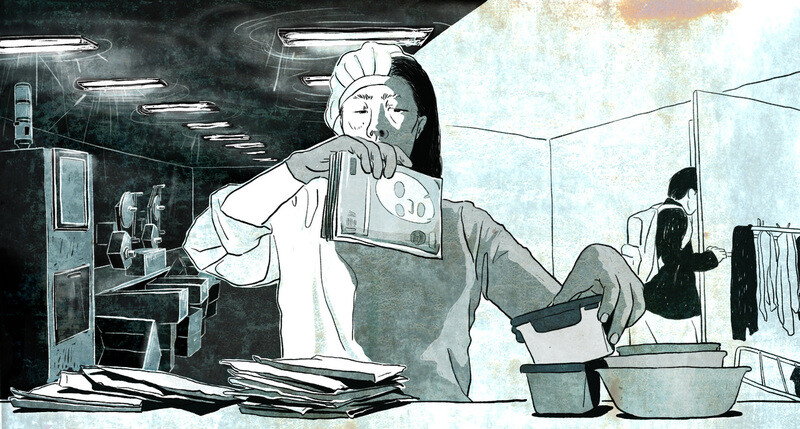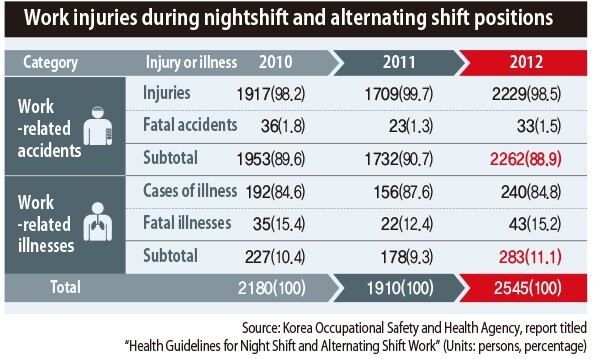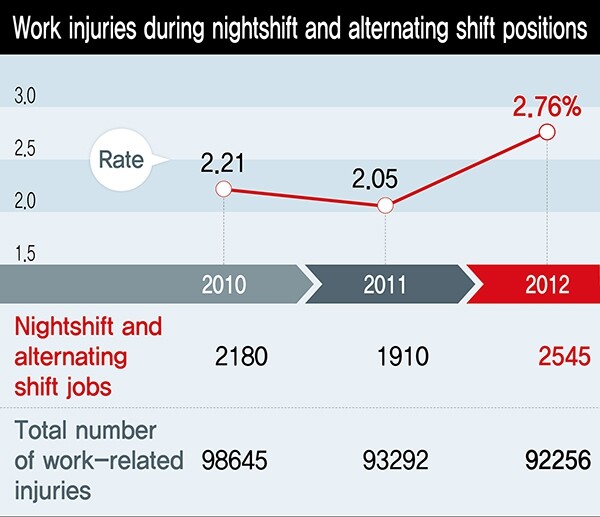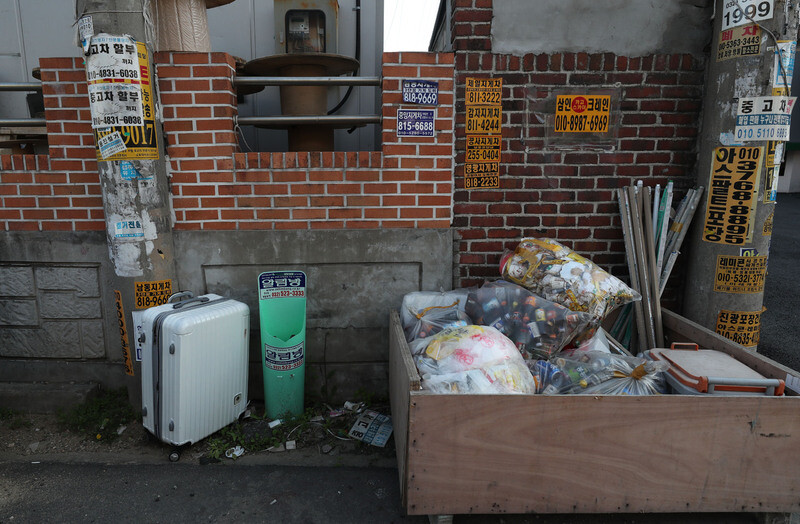hankyoreh
Links to other country sites 다른 나라 사이트 링크
[Reportage, Part 4-4]Flimsy, ineffective labor laws

Even so, the situation there wasn’t that bad, compared with the factory I worked at in February—a facility in Ansan, Gyeonggi Province, that manufactured printed circuit boards. That factory carved break time out of the lunch hour – ten minutes in the morning, 40 minutes at lunch time and 10 minutes in the afternoon. The evening meal was only 30 minutes, which meant that by the time you had wolfed down a meal and smoked a cigarette, it was already time to go back to the floor.
When lunch was shortened from an hour to forty minutes a year back, Ji-ae had even read through the labor law. “The law says that workers who work for eight hours must be allowed to rest at least one hour. That didn’t give me any grounds to complain,” she said. The “minimum” mandated by the law always turns out to be the “maximum” on the job.
Every day, the shift leader would tap people on the shoulder and see if they were staying for overtime. “Overtime?” she would ask, or sometimes “Let’s do overtime.” When the all-powerful shift leader said, “Let’s do overtime” (not even “How about some overtime?”), it was hard to say no. The job ad said that overtime and weekend work weren’t mandatory, but when the factory was on a deadline, there was little free choice unless you skipped out on work entirely.

Normalization of overtime
And I knew that if I skipped out, someone else would eventually have to pick up the slack. Another reason why you couldn’t get out of overtime was that the shuttle bus didn’t run at 5:30 am, when the shift officially ended. The only other option was to walk 10 minutes to a public bus stop, wait around until the bus showed up, and then transfer twice, which took 40 or 50 minutes—and that was just to the subway station.
There was yet another reason that it was hard to turn down overtime and weekend work. Only working the regular eight hours a day meant 208 hours and 1,573,770 won (US$1,404) a month. That’s just over half of the 2.68 million (US$2,391) that is the minimum amount needed to support a family of four in 2017 (60 percent of the median income). As a result, workers were faced with the choice of whether they would do two and a half hours of early morning overtime and make 30,120 won (US$26.87) extra (7,530 won x 150% x 2.5 hours + 7,530 x 50% x 0.5 hours), or whether they would leave on time and go to the trouble of tracking down a public bus only to arrive a little early at their pitch-black house. There was no question about the answer, but both options left much to be desired.
The same was true about missing work. Skipping a day of work without giving advance notice meant not only losing a day’s wages but also more than 300,000 won (US$267) in weekend pay, perfect attendance pay and bonuses according to the Labor Standards Act and the workplace rules. That might be one the monthly rent for one worker, or the cram school tuition for another’s kid. That was why these women were so determined to show up for work even when they were so sick they could barely roll out of bed.

On Mar. 9, when we had to go home “on time” because there was no extra work to do, one woman said, “If I don’t take this chance to relax, when will I get another chance?” But soon she was gone in search of a company that offered more overtime and weekend work.
The temp agency I was working for included this formula in their job ad: “(female) 1,573,770 won [US$1,404] in basic pay + bonus (100 percent) + perfect-attendance pay + holiday pay + overtime (150 percent) + weekend work (150 percent) + late-night work (50 percent).”
By meeting all of those criteria, the ad said, you could take home 3 million won (US$2,676) a month. That was the amount that could be earned by working overtime to get 10.5 hours each day and working through the weekends without taking any Saturdays or Sundays off, adding up to 303 hours (as of March).
Between Feb. 27 and Mar. 18, I worked on the weekends and did as much as overtime as possible except for four days. During that time, I received a total of (US$1,450) – which included two days of holiday pay and nine days’ worth of early morning meal allowance.
Farewell party with cup ramen
On the final day of the night shift on Mar. 16, the women at the factory each brought a cup of ramen noodles. “The night shift is ending today, right? We’ve got to celebrate with some ramen,” said Hui-suk, 45. Hot soup does wonders for an upset stomach, but the soup we were served for dinner was always lukewarm. The women brought along a can of tuna and plopped the tuna into the instant noodles. It was a fairly simple way to celebrate the end of the night shift. Around the table, I could hear people slurping down their noodles.
The women told stories about the factories they had been at before and consoled themselves with the thought that “at least it’s better here.”
“At least we get to work sitting down. Those women who have to handle the machinery have to stand up the whole time.“
“The last factory I worked at was on the verge of falling apart. This place seems to be decent – it’s clean, at least.”
“You know, the women who work at car part factories have to take care of ten machines by themselves. They even have to take turns when they go to lunch.”

As the women shared their experiences with each other, it ultimately sounded as if their stories were aimed at themselves.
When nearly two weeks had passed since my nights and days had switched places, my yawns started coming later and later. My sleep quality was gradually getting better, too. I could feel my body adjusting to the new schedule. But come next week, we would have to start working at 8:30 am again. It’s an infinite loop of day shift and night shift. Min-ju, who worked for nearly a year at a three-team, two-shift workplace, offered a tip for reversing the body clock in a short period of time: “After getting off work on Saturday morning, do whatever it takes to stay up until Saturday night and then sleep until Sunday morning.”
That would mean somehow managing to stay awake for more than 30 hours, from Friday afternoon until Saturday evening. As the women were getting changed in the locker room that day, an unconfirmed rumor was going around: “Next week, I hear they’re going to be cranking up the belt to its highest speed. It looks like there’s an order we have to meet. We’re going to get slammed again.”
When my undercover assignment—which was supposed to last for a month—was about to wrap up, I said goodbye to the women on the job and left the factory. As if they were familiar with this kind of farewell, the women made some inane jokes—“Let us know if you hear about a good job”—but they didn’t ask about the details.
The temp agency didn’t answer the phone, so I sent them a text message: “Something came up so it looks like I won’t be able to work from next week. No one answered when I called, so I’m sending a text message.” They wrote me back half an hour later: “You need to turn in your uniform to your shift or team leader. If you don’t, your wages will be docked.” There were no questions about why I was quitting and no appeal for me to stick around a little longer. The quitting process was as rapid as the hiring process.
“Thwack, thwack, thwack. . . thwack, thwack, thwack. . .” The familiar sound came to me in my dreams that night. The mask packs dropped onto the conveyor belt and tumbled out onto the work station. But that didn’t disturb the conveyor belt, which kept on rolling. As in my dream, the ever-rolling conveyor belt was like a Möbius strip that extended through an endless rotation of day and night shifts. I had completed my undercover assignment and jumped off that infinite track. I found myself wondering if the women would actually go out for some steamed monkfish on payday as they had planned. Was it the middle of the night for them, or the middle of the day? I was about to send them a message, but I stopped myself as I was reaching for my cell phone.
By Ko Han-sol, staff reporter
Please direct comments or questions to [english@hani.co.kr]
Editorial・opinion
![[Editorial] Does Yoon think the Korean public is wrong? [Editorial] Does Yoon think the Korean public is wrong?](https://flexible.img.hani.co.kr/flexible/normal/500/300/imgdb/original/2024/0417/8517133419684774.jpg) [Editorial] Does Yoon think the Korean public is wrong?
[Editorial] Does Yoon think the Korean public is wrong?![[Editorial] As it bolsters its alliance with US, Japan must be accountable for past [Editorial] As it bolsters its alliance with US, Japan must be accountable for past](https://flexible.img.hani.co.kr/flexible/normal/500/300/imgdb/original/2024/0417/6817133413968321.jpg) [Editorial] As it bolsters its alliance with US, Japan must be accountable for past
[Editorial] As it bolsters its alliance with US, Japan must be accountable for past- [Guest essay] Amending the Constitution is Yoon’s key to leaving office in public’s good graces
- [Editorial] 10 years on, lessons of Sewol tragedy must never be forgotten
- [Column] A death blow to Korea’s prosecutor politics
- [Correspondent’s column] The US and the end of Japanese pacifism
- [Guest essay] How Korea turned its trainee doctors into monsters
- [Guest essay] As someone who helped forge Seoul-Moscow ties, their status today troubles me
- [Editorial] Koreans sent a loud and clear message to Yoon
- [Column] In Korea’s midterm elections, it’s time for accountability
Most viewed articles
- 1‘Right direction’: After judgment day from voters, Yoon shrugs off calls for change
- 2[Editorial] Does Yoon think the Korean public is wrong?
- 3Where Sewol sank 10 years ago, a sea of tears as parents mourn lost children
- 4[Editorial] As it bolsters its alliance with US, Japan must be accountable for past
- 5Strong dollar isn’t all that’s pushing won exchange rate into to 1,400 range
- 6[Guest essay] Amending the Constitution is Yoon’s key to leaving office in public’s good graces
- 7Japan officially says compensation of Korean forced laborers isn’t its responsibility
- 8US, Japan and China move to become self-sufficient in semiconductors
- 9In 50 years, half of Koreans are expected to be 65 or older
- 10[News analysis] Watershed augmentation of US-Japan alliance to put Korea’s diplomacy to the test